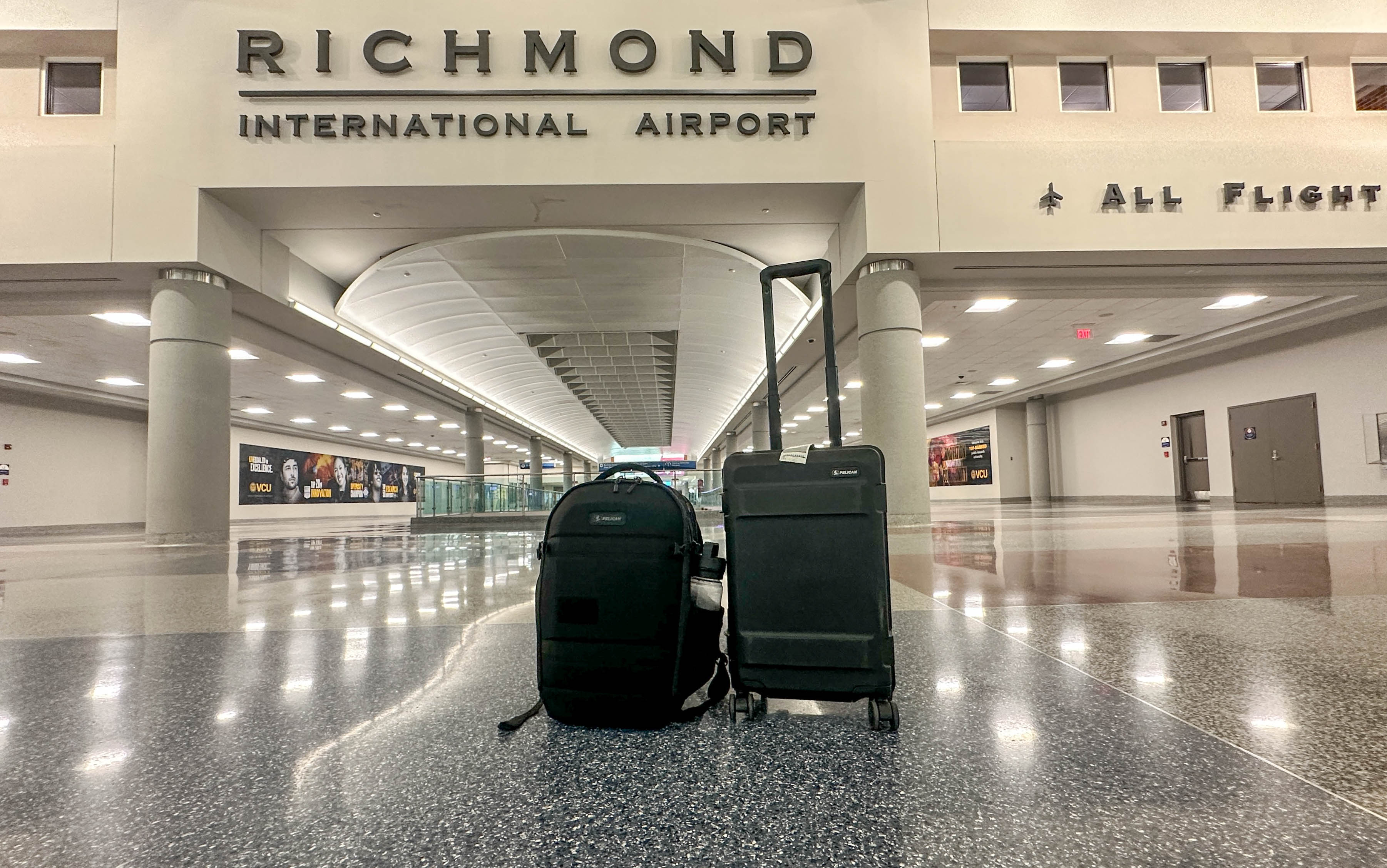Best Concealed Carry Guns of 2024
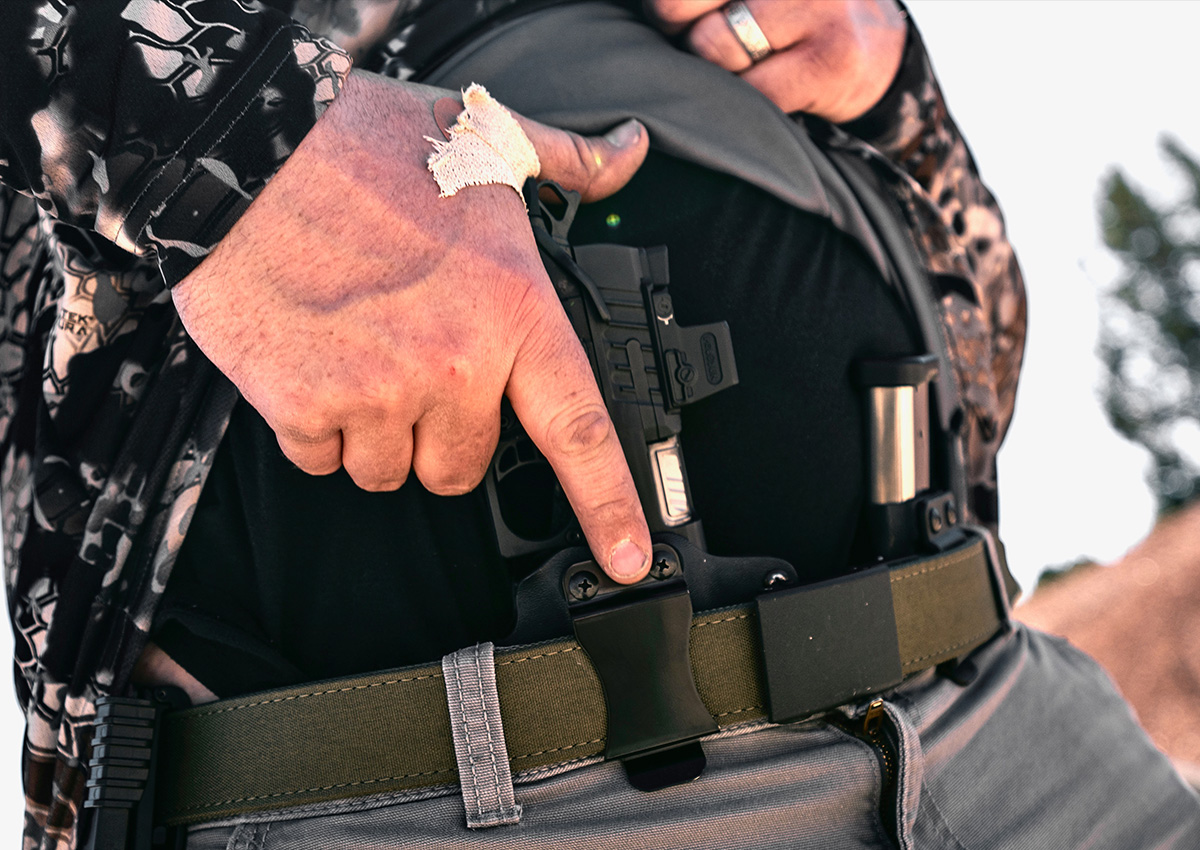
We may earn revenue from the products available on this page and participate in affiliate programs. Learn More ›
A concealed-carry handgun is an important tool. You need something that you can use effectively and, more importantly, carry every day comfortably. Go to any gun store and you’ll see that the options can be staggering. There is a wide variety of sizes, styles, calibers, and price points, so I’m here to help you sort through a few of the best concealed carry guns you can buy today.
How I Chose the Best Concealed Carry Guns
I selected a dozen concealed carry guns that either I or the Outdoor Life staff have shot or tested strenuously. I carry every day, and spend a lot of time shooting various handguns. I’ve fired over 20,000 rounds through handguns annually over the past few years, and have gotten an in-depth look at how all of these pistols and revolvers stack up. Many of them include linked in-depth reviews that you can check out. I made my picks for this list based not only on what the highest performers are, but also on reliability, practicality, and value. This provides a spectrum of options from which just about anybody can find something they will like and can afford.
Concealed-Carry Accessories
Picking a pistol or revolver is just the first step in setting yourself up for safe, effective concealed carry. Gearing up with good accessories like these can make your EDC setup more comfortable and practical.
Best Concealed Carry Guns: Reviews & Recommendations
Staccato CS
See It
Pros
- High-quality parts and fit
- Very accurate
- Great trigger
- Soft recoil
Cons
- Expensive
- Bulkier grip than some other compact striker-fired pistols
Key Features
- Caliber: 9mm
- Capacity: 16+1
- Barrel length: 3.5 inches
- Weight: 27 ounces
- Dawson Precision optics mounting system
- Dual rod and spring recoil system
- Price: $2500
Staccato 2011 (formerly STI) introduced the CS for 2023, and after putting a collective 2,500-3,000 rounds through two of them, I’m sold. I’ve found them to be very reliable with every type of ammunition I could find—from 115-grain ball through 147-grain hollowpoints. easy to shoot, and incredibly accurate. The average of 10 groups I fired from a supported position at 50 yards with three different types of ammunition was .676 inches. Read a full review of the Staccato CS here.
At around the size of a Glock 19, just slightly slimmer, the Staccato CS is a downsized 2011 pistol. It has some key differences from larger 2011’s and 2011-style pistols like the Staccato P and Springfield 1911 DS Prodigy. The grip and frame are smaller, and the CS uses a re-designed magazine that’s similar in shape and size to the Sig P365’s magazines. It still uses the 1911’s controls and trigger, but the recoil system has been updated to a dual guide rod system that makes the CS the flattest-shooting compact 9mm I’ve fired.
The Staccato CS is an expensive gun, and the supply bottleneck is resulting in some being scalped for pretty wild prices. Ordered from Staccato, the pistol will cost $2,500, but we’ve seen the tangible benefits you’re getting for the money—both in the build quality and on-target performance.
Sig Sauer P365 XMacro Tacops
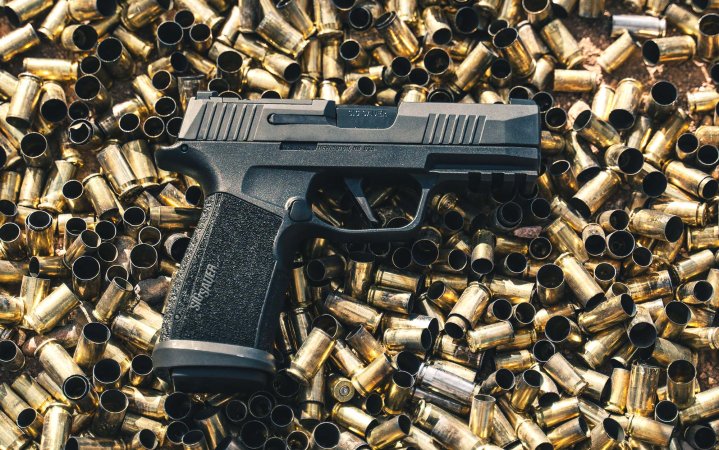
See It
Pros
- Great ergonomics
- Best in-class capacity
- Low recoil impulse
- Modular fire control unit
Cons
- Trigger is a little mushy
Key Features
- Caliber: 9mm
- Capacity: 17+1
- Barrel Length: 3.7 inches
- Weight: 23 ounces
- Three-dot night sights
- Optics-ready
- Price: $800
Sig Sauer has been busy over the past few years, producing an array of variations of their front-running models. The Sig Sauer P365 XMacro Tacops is the second iteration of the P365 XMacro, which is an up-sized version of the micro-compact P365 that features a compensator-cut slide. If the XMacro Tacops seems a little redundant, it is, but it is one of the best compact concealed carry guns right now. It’s ultra slim, with unmatched capacity in its class.
The biggest difference between the Tacops and standard XMacro is a slight simplification. The Tacops is the same overall size, but has a longer barrel because it lacks the integral slide compensator. The XMacro Tacops also features a small magwell that’s effective, but unobtrusive. Compared to the smaller standard P365, the XMacro Tacops has a larger grip and longer slide. The 17-round magazines are the same, and they fit in the P365, they’re just longer. The XMacro Tacops has a similar footprint to the Glock G19 and Staccato CS, but it’s a little more comfortable to carry inside the waistband because it’s thinner.
Read Next: How to Hold a Pistol
I’ve expended about 1,800 rounds between two of these pistols, and aside from a couple failures to feed in the first 100-round break-in period, they’ve run great. The P365 XMacro Tacops is an incredibly soft-shooting pistol, and points intuitively. The trigger isn’t too heavy, but it doesn’t have a firm wall. At our 2023 gun test, we did some slow-mo video analysis of rapid fire strings between the Tacops and ported XMacro, and found that the more affordable Tacops showed only slightly more muzzle flip. I couldn’t tell the difference while shooting them. You can read a full review of the Sig P365 XMacro Tacops here.
Walther PDP Compact Steel Frame 4-inch
Alex Robinson 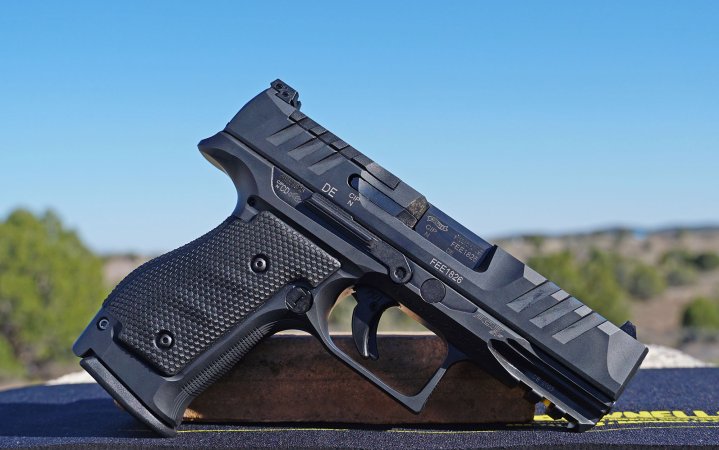
See It
Pros
- Excellent ergonomics
- Optic compatible
- Good accuracy
- Smooth recoil
Key Features
- Caliber: 9mm
- Capacity: 15+1
- Barrel length: 4 inches
- Weight: 2 pounds, 7 ounces (weighed with empty magazine)
- Optic compatibility: Uses optic-specific adapter plates.
The Walther PDP Compact Steel Frame pistol is one that took us a bit by surprise. There aren’t any particularly eye-catching features on this pistol and despite its good ergonomics, it does feel a bit chunky for a concealed carry gun. Add to that the weight of the steel frame and I was somewhat skeptical. Those misgivings melted away as soon as the shooting started, though.
This PDP is one of the latest in Walther’s successful striker-fired lineup that includes the polymer-framed PDP-F series and the full-sized PDP Match SF — both of which I have shot extensively in the past year. This new steel frame compact model aims to capture the tangible recoil-mitigating characteristics of the match gun, but in a carry-friendly package. Though heavy and thick it is, the pistol sports wrap-around grip panels with excellent hexagonal texturing and superb ergonomics for large-handed shooters.
This compact pistol carries over many of the features we already like about the PDP including the long ambidextrous slide stop levers that are easy to reach with the thumb, a reversible magazine catch button, and nicely executed scalloping and serrations on the slide. It’s got a 3-slot accessory rail machined into the dust cover and is compatible with a variety of optics using Walther’s adapter plates.
OA Defense OA 2311 Compact Pro
Tyler Freel 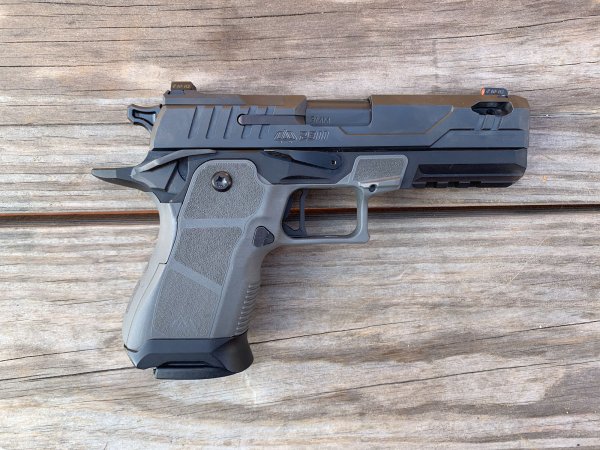
See It
Pros
- Good Trigger
- Ultra flat shooting
- Uses Sig P320-pattern magazines
- Customizable grip module
Cons
- Had a considerable break-in period and showed some unusual wear patterns
OA Defense OA 2311 Compact Pro Key Features
- Cartridge: 9mm
- Capacity: 15+1
- Barrel length: 4.25 inches
- Weight: 1 pound, 12 ounces (weighed with empty magazine and no optic)
- Optic compatibility: Includes optic-specific adapter plates.
- Trigger: Single-action, flat shoe, 4 pounds, 8 ounces (measured)
- Price: $2,349
This premium-grade pistol has taken the 2011 trend in a unique direction. Many of the basic elements of a 2011-style pistol are there, like a short frame with grip module and a 1911-style trigger and hammer, but it’s built to use Sig Sauer P320-pattern magazines — which are more numerous, affordable, and tend to be less finicky than actual 2011-style magazines. This selling point got the company a lot of attention since their debut in 2023, and I was very excited to shoot their new Compact Pro model after taking it for a spin at SHOT Show 2024.
The OA 2311 Compact Pro has a profile similar to a Glock G19, but uses an aluminum frame and polymer grip module that’s capped with a magwell. The grip module is intended to be user-modified or stippled, and features gas-pedal-type thumb rests on both sides, as well as ambidextrous controls and a reversible mag catch button. We got the ported model, which has ports drilled through the slide and barrel to help reduce muzzle flip — and it works wonderfully at that. This is one of the flattest-shooting 9mm compacts that I’ve ever fired. As a package, it comes with five magazines, a nice carrying case, and a number of optic plates. I installed a Holosun EPS Carry for my full-length review, but we also tested it with iron sights at the gun test.

I wasn’t totally hot on the pistol’s ergonomics, and the grip didn’t fit my hand perfectly. The only real downside though, was the rough break-in period the gun had. It took approximately 300 rounds for the pistol to run most types of ammo smoothly, and it was still a little picky. I noticed some excessive wear on the inner surfaces of the slide and behind the disconnector — that binding and friction will slow a gun down just enough to cause problems. It wasn’t a deal breaker for the test time, but something we took note of. Once running smooth, this is a very formidable concealed carry gun.
Photo by Tanner Denton 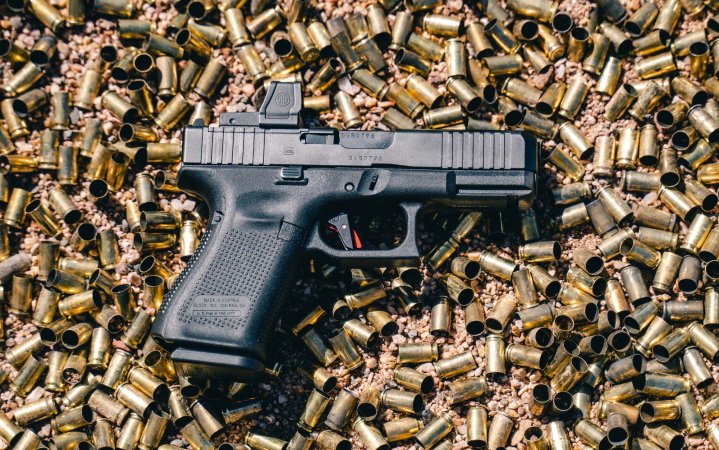
See It
Pros
- Time proven and reliable
- Good capacity
- Many aftermarket upgrades available
- Commonly available holsters
Cons
- Iron sights aren’t great
- Grip angle is different than most other pistols
Key Features
- Caliber: 9mm
- Capacity: 15+1
- Barrel Length: 4.02 inches
- Weight: 21 ounces
- Gen 5 MOS version is optic-ready
- Ambidextrous slide stop and reversible mag-catch
- Price: $570
Glock’s 19th model, the Glock G19, is one of the most prolific and effective concealed carry guns in the world. Glock was an original innovator and is still a superpower in the world of polymer-framed, striker-fired pistols, and the G19 is one of many successful Glock models. It’s one of the original compact, 9mm poly pistols, and still one of the best concealed carry guns on the market today. You can also get a 1-to-1 trainer for the G19, chambered in .22 LR — the Glock G44.
The Glock G19’s beauty is in its simplicity. Let’s face it, it’s not beautiful in any other way. The G19 is effective though. It’s relatively easy to conceal, easy to shoot, and very simple to operate. Glock’s built a reputation of reliability over the decades, and the G19 has managed to stay at the front of the pack since the late 80s. Not many similar-sized pistols have bested its 15+1-round capacity, and it’s available in just about every gun store.
Despite their motto of “perfection,” there are some things that shooters commonly modify on their Glock G19’s. The factory sights must go immediately. Really they aren’t terrible, but they could be much better, and there is an entire industry of aftermarket Glock-compatible parts, sights, and accessories that has grown up alongside the G19. Companies like Shadow Systems and Palmetto State Armory even offer G19 clone pistols. If you get the Gen 5 MOS version of the G19, you’ll see some updates to the grip, an ambidextrous slide stop, and an optics-ready slide. Even after 35 years, the G19 is one of the best carry guns you can buy.
Colt Python 3-inch
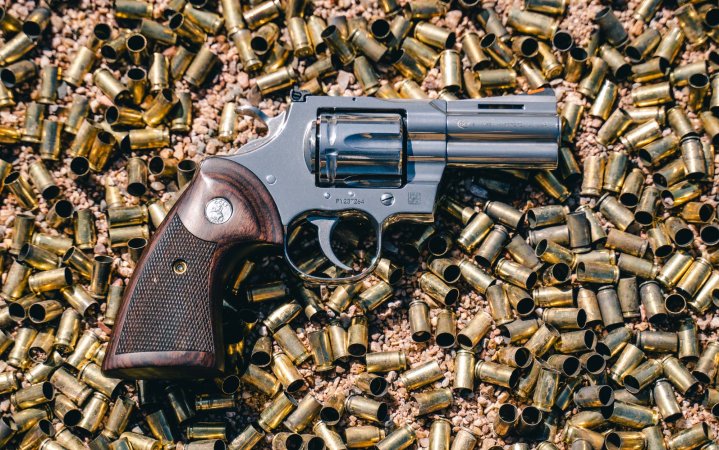
See It
Pros
- Excellent fit and quality
- Smooth double- and single-action trigger
- Improved frame strength from older Pythons
- Adjustable sights
Cons
- Full-size grip isn’t the easiest to conceal
Key Features
- Caliber: .357 Magnum
- Capacity: 6
- Barrel Length: 3 inches
- Weight: 38 ounces
- Polished stainless steel
- Interchangeable front ramp sight
- Price: $1,472
There are some folks who subscribe to the theory that real guns are wheel guns, and they’d trust their life to nothing but a revolver. There are some great revolvers to choose from, but one of my favorites has been the Colt Python 3-inch model. In recent years, Colt has breathed new life into its classic Python line, and the 3-inch model is one of their most recent. The short .357 Mag revolver might be a little stubby, but it’s all Python. For a revolver fan that wants to carry under a jacket, it’s one of the best concealed carry guns you can choose.
Everything about the Colt Python 3-inch is Python, just with a shorter barrel. It features the same quality wood grips, same frame and cylinder, and the contemporary Pythons have a bit of reinforcement added to the frame under the rear sight. They hold six rounds and use a transfer bar firing system so that you can safely carry it with a round under the lowered hammer.
The Cold Python 3-inch is as much about nostalgia as performance, and it performs very well. Operation is butter-smooth, and the full-size grip makes full-power defensive loads quite manageable. This revolver isn’t the most concealable, but for OWB carry under a jacket, or even IWB under a loose shirt, you don’t find too many options better—or cooler—than the Python. You can read a full review of the Colt Python 3-inch here.

See It
Pros
- Ultra-concealable
- Great grip texture
- Points naturally
- Cross-compatible with other OEM and aftermarket P365 parts
Cons
- Triggers are a little mushy
Key Features
- Caliber: 9mm
- Capacity: 10+1
- Barrel Length: 3.1 inches
- Weight: 22 ounces
- Beveled slide for concealed carry
- Modular fire control unit and grip design
- Price: $499
The ember that seemingly lit the blazing hot micro 9mm pistol market is the Sig P365. There have been many other micro-compact 9mm pistols, but the Sig P365 was one of the first to maximize capacity of the tiny platforms. The Standard P365 holds 10 rounds in its small double-stack magazine, while keeping its ultra-discreet size.
Many other tiny nines have hit the market in recent years, but the P365 is well thought out and still holding its own. The standard black nitron model comes with three-dot Xray tritium night sights and two magazines. Both mags hold 10 rounds of 9mm, but one has a slightly extended baseplate to give the pinky finger some real estate to grip. The ergonomics and grip shape of the P365 are excellent, and the pistol points well. Recoil is a little snappy, but in line with what most micro 9mm pistols feel like.
There are many P365 models, but the standard is still one of the best concealed carry guns on the market. The strength of the P365 is not just in its performance, but its modularity. The fire control units (FCU’s) of every 9mm P365 are compatible, and you can get upgraded FCU’s, grips, and other parts. You can even swap some parts, such as carrying the P365 XL/P365 XMacro Tacops slide assembly installed on your standard P365 for a longer sight radius and softer recoil while keeping the short grip. You can read a full review of the Sig Sauer P365 here.
Walther PDP-F 3.5-Inch
Tyler Freel 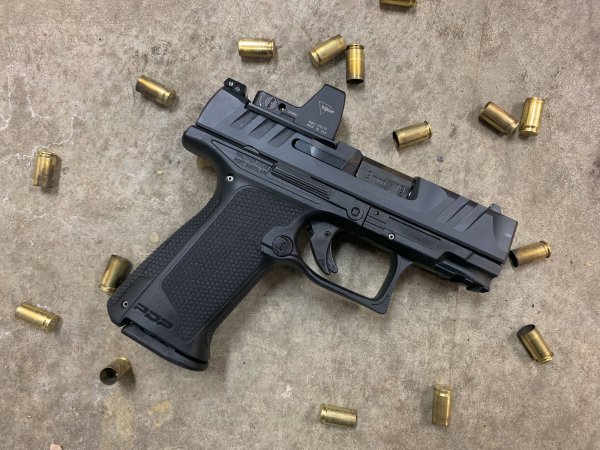
See It
Pros
- Slim and compact
- Full 15+1 capacity
- Optic compatible
- Great slide serrations
Cons
- Not as heavy and flat-shooting as the steel-frame PDP model
Key Features
- Caliber: 9mm
- Capacity: 15+1
- Barrel length: 3.5 inches
- Weight: 23 ounces
- Walther optic plate system
- Adjustable rear sight
- Price: $650
Walther’s PDP-F series is designed with female shooters in mind, but this is a concealed carry gun that just about anyone will like. It’s got what we like about the PDP platform, but with a slender grip and shorter trigger reach. Compared to the chunky full-sized PDP, the PDP-F is more comfortable to carry inside the waistband, but still offers excellent ergonomics.
Like the standard PDP pistols, this Walther features three-dot white sights with a rear sight that’s adjustable for windage and elevation. The slide also features a removable cover plate and can be fitted with one of Walther’s optic adapter plates and fitted with a red dot. I tested one with the Trijicon RMR and it was a wonderful-shooting pistol. You can read a full review here.
PSA Dagger Micro C-1
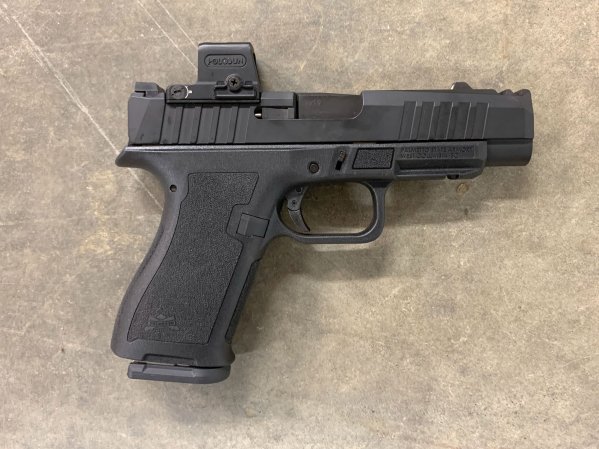
See It
Pros
- Very affordable
- Reliable
- Optic-ready
- Compensator reduces muzzle flip
- Good ergonomics
Cons
- Only includes one magazine
Key Features
- Caliber: 9mm
- Capacity: 15+1
- Barrel length: 3.4 inches
- Weight: 18 ounces
- Shield RMSc optic cut
- Integral muzzle compensator
- Price: $360
The PSA Micro Dagger is one of the best values in budget concealed carry guns. It’s a Glock clone with slides, barrels, and recoil assemblies that are compatible with the G43, G43X, and G48 Glock pistols, but offered for less than $400. Like the larger PSA Dagger, the Micro Dagger features slightly more refined ergonomics and features like nicely beveled edges and more aggressive cocking serrations on the slide. It comes standard with 3-dot white iron sights, and an optic cut that’s compatible with Shield RMSc footprint optics like the Holosun EPS Carry. The C-1 model of the Micro Dagger features a 3.4-inch barrel and integral compensator built into the slide.
In testing, the compensator does help reduce muzzle flip, but it doesn’t seem to be quite as effective as compensators that have a more enclosed expansion chamber like that on the Springfield Hellcat Pro Comp. Still, it’s a beneficial feature to help keep you on target. I fired over 500 rounds through my test sample and didn’t experience a single malfunction through many different types of of practice and defensive ammo. This pistol has a hinged trigger that’s similar in feel to a standard Glock, and it includes a hybrid steel/polymer 15-round magazine (the Glock G43X only comes with 10). To keep costs down, the gun only comes with one magazine, but you can order more here.
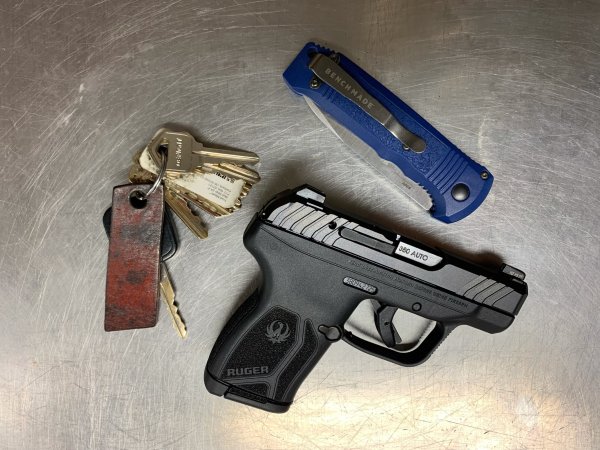
See It
Pros
- Tiny footprint
- Great cocking serrations
- Excellent capacity for size
- Very affordable
Cons
- Not very accurate at longer distances
Key Features
- Caliber: .380 ACP
- Capacity: 10+1, 12+1
- Barrel Length: 2.8 inches
- Weight: 10.6 ounces
- Cocking ears on slide
- Tritium front sight
- Price: $329
Although small, the .380 ACP cartridge is still popular among the best guns for concealed carry. Ruger saw great success with their single-stack LCP pistol, but recognized room for improvement. As the micro-compact pistol market has surged, and manufacturers have boosted the capacity of these tiny guns, Ruger followed suit.
With the slightly extended magazine, the LCP Max holds 13 rounds of ammunition, and is only slightly thicker than the original single-stack design. It’s easy to shoot, reliable, and small enough to stick in a pocket. With the high-performance projectiles we have today, a high-capacity .380 pocket pistol is still a formidable defensive concealed carry gun.
Read Next: 30 Super Carry vs 9mm: Which is the Better Self-Defense Cartridge?
The Ruger LCP Max is reasonably accurate out to 15 yards or so, but it’s most effective at very close range. The slide cycles fast, and the recoil feels a bit snappy, but there isn’t much muzzle flip and the pistol is very easy to control. You can read a full review of the Ruger LCP Max here.
Taurus GX4 XL T.O.R.O.
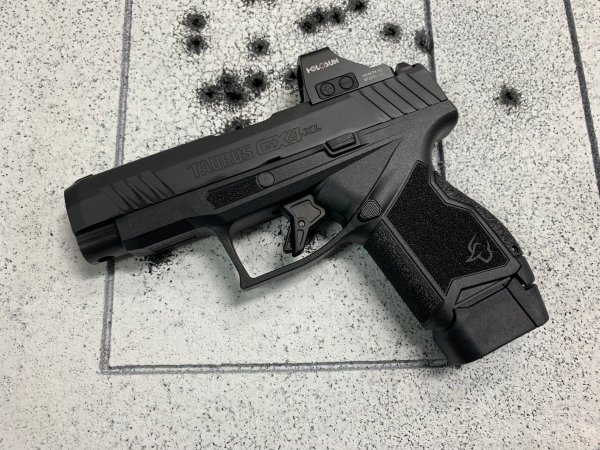
See It
Pros
- Very concealable
- Good optic-mounting system
- Soft-shooting
- Very affordable
Cons
- Some pistols have reliability issues during break-in
Key Features
- Caliber: 9mm
- Capacity: 11+1, 13+1
- Barrel Length: 3.71 inches
- Weight: 20 ounces
- Beveled slide for easy holstering
- Interchangeable backstraps
- Price: $400
Taurus is known for affordable pistols, and their GX4 and GX4XL have turned out to be excellent values in the market of concealed carry guns. The GX4XL is a sub-compact 9mm with a slightly longer barrel (3.7 in.) than its predecessor, the GX4 (3.06 in.). It comes with an 11- and 13-round magazine, and the T.O.R.O. model comes optics-ready with an RMS pattern and removable rear pillars.
The GX4 and GX4XL are built in a similar fashion as the Sig P365 Line. Rather than slide rails molded into the frame, the trigger assembly and slide rails are in a removable stainless steel chassis that sits in the grip module. Like the P365, this allows modularity between models, and the GX4XL is similar to the P365 XL in size. With the longer slide and recoil system, the GX4XL is surprisingly soft shooting. It has a good trigger that isn’t light, but it is crisp.
In putting more than 1,000 rounds through two different GX4XL T.O.R.O. pistols, I noted that one of them had some reliability issues at first. When chambering, the slide would stop about ¼-inch out of battery. After about 250 rounds fired, the gun broke in and I didn’t encounter any more function issues. The second pistol never malfunctioned. These pistols can be found for between $350 and $400. Considering the feature set, shootability, and price, this is a great value among the best concealed carry guns. You can read the full review of the GX4XL T.O.R.O. here.
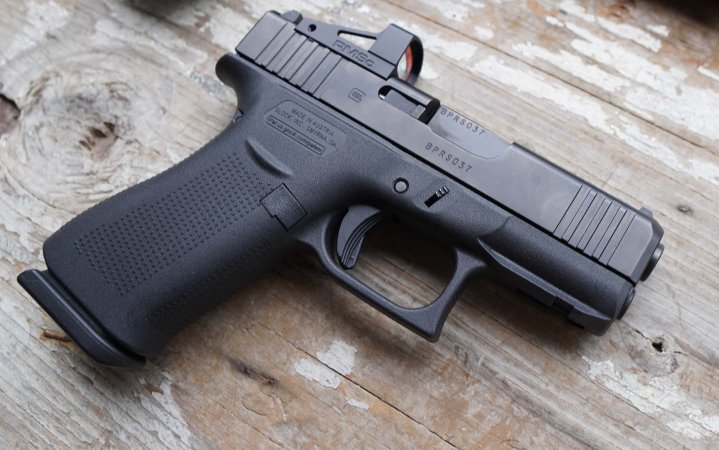
See It
Pros
- Very reliable
- Improved grip
- Increased capacity from G43
- Comfortable to shoot
Cons
- Not best-in-class capacity
Key Features
- Caliber: 9mm
- Capacity: 10+1
- Barrel Length: 3.41 inches
- Weight: 23.1 ounces
- MOS model is Optics-ready
- Front and rear cocking serrations
- Price: $448
The G43X is the pistol that keeps Glock’s sub-compact line in the running with other pistols like the P365. The Glock G43 has long been one of the best concealed carry guns, but the single-stack format has fallen out-of-favor with many shooters.
Adding capacity to the Glock 43, the 43X incorporates a 3.41-inch barrel, and slim frame with front and rear cocking serrations. It uses a 10-round magazine, a significant boost over the standard G43’s 6 rounds. You won’t find a lot of frills, but if you’re a fan of Glocks, you know what you’re getting—a reliable pistol that’s ultra-comfortable to carry and shoot.
The MOS version of the G43X is optics ready, and you can find G43X and optic packages at an affordable price. The newer G48 has generated lots of interest too—it’s slimmer and has the same capacity. However, several shooters I’ve talked to weren’t pleased with the feel of the G48 when shooting and still prefer the G43X.
Smith & Wesson Shield Plus
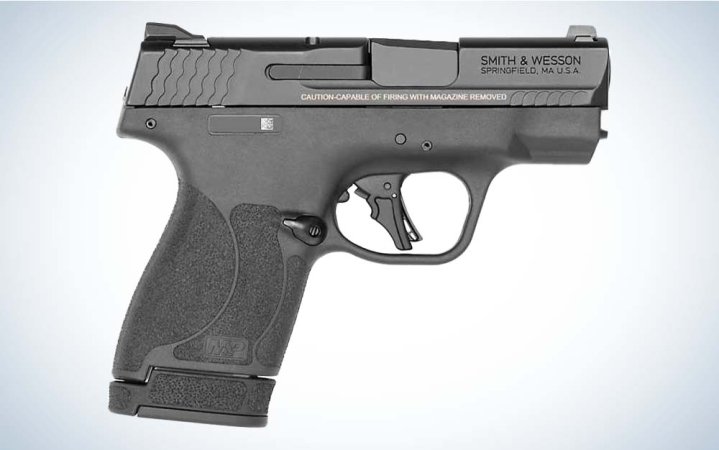
See It
Pros
- Excellent grip
- Good sights
- Streamlined shape
- Flush and extended magazine
Key Features
- Caliber: 9mm
- Capacity: 10+1, 13+1
- Barrel Length: 3.1 inches
- Weight: 20 ounces
- Stainless steel slide and barrel
- Orange-ring tritium night sights
- Price: $399
The M&P Shield Plus from Smith & Wesson is an updated version of the Shield and Shield 2.0, with increased capacity. Although it doesn’t include a light rail, the grip texture, handling, and ergonomics of the Shield Plus are excellent. For folks who are fond of the Smith & Wesson M&P line and shoot them well, this is one of the best carry guns out there.
In the rapidly developing field of micro-compact pistols, capacity is important, and the 9mm Shield Plus comes with flush and extended magazines with 10+1 and 13+1 capacity respectively.
The M&P Shield Plus really shines in its early adoption of the new .30 Super Carry cartridge from Federal. The smaller-diameter cartridge produces similar ballistic performance as the 9mm but with increased capacity. The .30 Super Carry Shield Plus will hold an impressive 13+1 and 16+1 rounds in its flush and extended magazines, while delivering 9mm performance.

See It
Pros
- Excellent grip and grip texture
- Good sights
- Optic-ready
- Flush magazine with great capacity
Key Features
- Caliber: 9mm
- Capacity: 15+1
- Barrel Length: 3.7 inches
- Weight: 20.7 ounces
- Tritium front sight, U-notch rear sight
- Price: $599
Like many of its peers, the Springfield Hellcat Pro seeks to strike a perfect balance between concealability and magazine capacity. In that regard, it does a good job. It is a hair smaller than a Glock 19 and a hair larger than the Micro-9s but has a 15+1 capacity with flush-mounted magazines. It is also trimmer than a G19 and has low-profile controls for snag-free carry.
Like other Springfield pistols, it is spec-ed out with a solid list of features. It has a reversible magazine catch, a loaded-chamber indicator on the top of the slide, it comes with two quality magazines, has a tough Melonite finish, a generously-sized accessory rail, and cocking serrations on the front and rear of the slide.
The Hellcat Pro OSP is a heavy-hitter in the sub-compact market, and it’s a reliable, solid choice among the best concealed carry guns. Although the muzzle flip isn’t bad, the Hellcat pistols tend to have slightly snappier recoil than other similar-sized guns, but they still aren’t bad to shoot. They are one of the best at packing a lot of ammunition into a slim, small package.
Smith & Wesson 351 PD .22 WMR
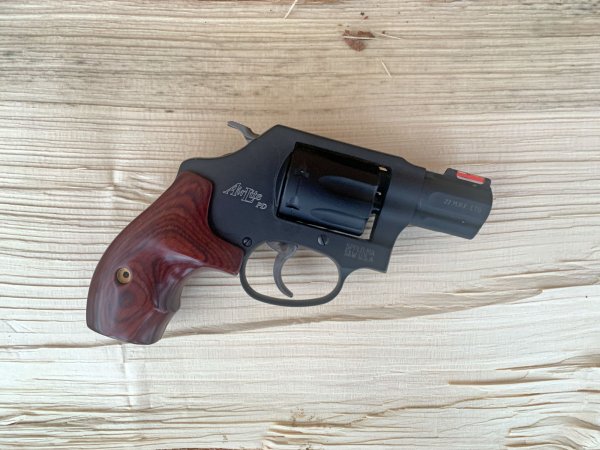
See It
Pros
- Light and compact
- Easy to shoot
- Good ammunition capacity
- Useful for more than just self defense
Cons
- Expensive for a rimfire
- Not very accurate beyond 15 yards
- Not as potent as larger cartridges
Key Features
- Caliber: .22 WMR
- Capacity: 7
- Barrel length: 1.88 inches
- Weight: 11.4 ounces
- Fiber-optic front sight
- Aluminum Frame
- Price: $810
The Smith & Wesson 351 PD is an AirLite series J-frame revolver that’s chambered in .22 Magnum. It’s light even when loaded, and boasts an impressive 7 round capacity. Other J-frames chambered in .38 Special and .357 Magnum are certainly more potent, but they are also much more difficult to shoot with speed and precision — even at close range. The .22 Mag. chambered 351 PD offers the same concealable size and feel, but it’s much easier, and more fun, to shoot.
This is a great option for a practice gun for someone who carries a larger cartridge in a J-frame regularly, and is well-suited for anyone who might struggle to control the sharp, flippy recoil of a .38 or .357. Though .22 Magnum might not be the most potent self-defense cartridge, it’s performance has been elevated by defense-specific loads like Federal’s Punch and Speer Gold Dot.
More than just a dedicated EDC revolver, the 351 PD would be quite useful as a carry gun for a trapper or backwoods hunter. It’s not especially accurate, but would be useful for small game under 15 yards, and is generally a fun and affordable revolver to shoot. You’re guaranteed to shoot it much more than the same platform chambered in .357 Mag., and for a tool you might have to use in the most stressful of situations, that counts for a lot. You can read our full review of the Smith & Wesson 351 PD here.
Ruger LCR .22LR
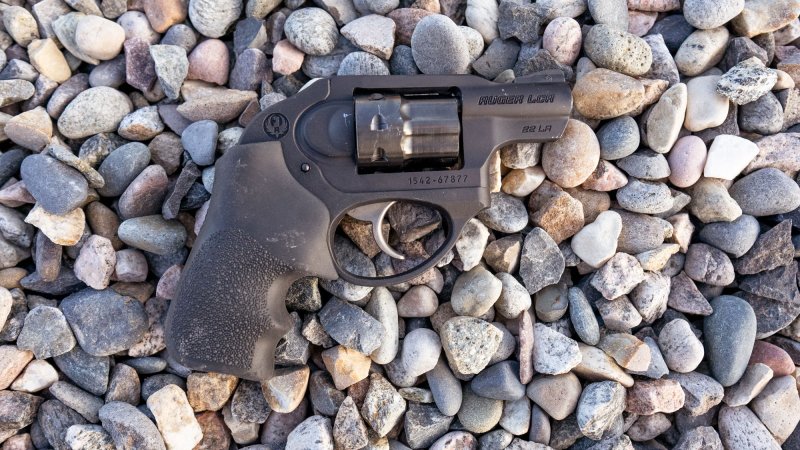
See It
Pros
- Convenient and compact
- Good ergonomics
- Great trainer
- Good capacity
Cons
- Aesthetics aren’t exceptional.
Key Features
- Caliber: .22 LR
- Capacity: 8
- Barrel Length: 1.87 inches
- Weight: 14.4 ounces
- Low-profile sights
- Price: $627
Everyone has different needs and preferences when it comes to a carry gun, and some folks find that a compact .22 LR revolver suits them fine. The Ruger LCR .22 holds 8 rounds of ammo, and features a comfortable Hogue grip. The revolver is easily concealed, and can be constantly on-duty for pests or threats. The .22 is arguably underpowered for general self-defense applications, but the gun you have on you is better than the one you don’t. One way to resolve that issue is to go with .22 LR ammo that is purpose-build for self defense.
This revolver isn’t as handsome as many others on the market, but it’s fun to shoot, easy to maintain, and can be carried as an EDC option, or used as a trainer for larger-caliber revolvers. OL Shooting Editor John B. Snow tested the Ruger LCR hard and you can read his full review here.
Beretta PX4 Storm Compact Carry 2
Photo by Alex Robinson 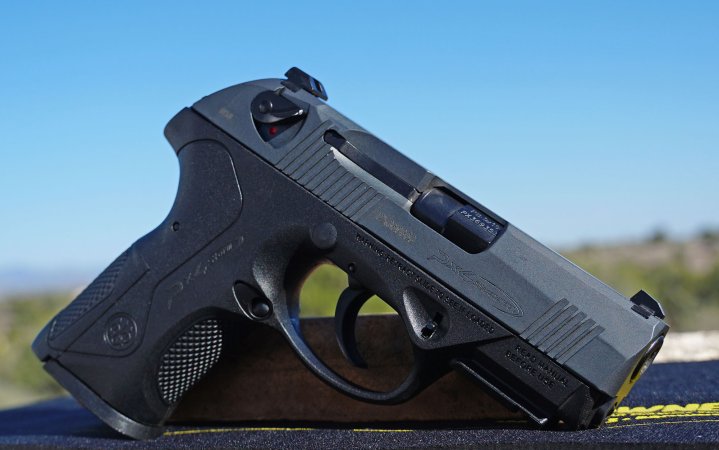
See It
Pros
- Good ergonomics
- Smooth shooting/soft recoil
- Good capacity
- Snag-free edges
Cons
- Thick and chunky
- Double/single-action operation isn’t my favorite
Key Features
- Cartridge: 9mm
- Capacity: 15+1
- Barrel length: 3.2 inches
- Weight: 1 pound, 11 ounces (weighed with empty magazine)
- Optic compatibility: Not optic compatible
- Trigger: Double/single-action 7 pounds, 9 ounces (measured)
- MSRP: $802
Beretta’s PX4 Storm has been a popular carry gun, and the new PX4 Storm Concealed Carry 2 is further optimized for the task at hand. Like the regular PX4, it features a rotating barrel design, but the CC2 version has a heavier barrel that adds mass and mitigates recoil. Notably, it also has an improved decocker and bobbed, snag-free hammer and improved double-action trigger pull.
The whole test team found the PX4 to be a soft, manageable shooter, and some really liked it. We had mixed feelings though. Some of us plainly thought it would be smaller than it is, and it certainly does have a thick, chunky feel to it. That thickness does help the shooter get more purchase on the gun, but considering the abundant number of manageable pistols that are more compact with equal or greater capacity, we had a hard time falling in love with this one.
The double-action/single-action operation isn’t what most shooters will choose, but if you’re already a Beretta 92 fan or comfortable with those pistols, you will probably like the PX4 Storm.
Read Next: The Best Concealed Carry Holsters of 2023
How to Choose the Best Concealed Carry Gun

If you’re wondering, What’s the best concealed carry gun?, well, the answer depends. Choosing the best concealed carry gun for you means considering several factors:
- Carry position and where you prefer to carry your gun
- Your clothing style and how well it conceals a gun
- How well the concealed carry gun fits your hand
- Your budget
Picking a concealed carry gun is a personal matter, and everyone will have different preferences based on their individual needs. However, there are excellent starting points, and our team has been able to thoroughly test and vet every gun on this list. Whether the feature set, size, or budget is most important to you, you’ll likely find a concealed carry gun on this list that will fit your needs. Most importantly, get some qualified training before you start carrying.
Read Next: Best 9mm Ammo
Best Concealed Carry Guns FAQs
It’s most important to carry a gun that you can shoot safely and effectively, and for running, a holster that holds the gun securely to your body is more important than the particular handgun you choose. A concealed carry gun that’s light enough to carry on your day-to-day will work just fine for running, but a micro-compact will be your most concealable option.
There are many methods to conceal carry that are very safe, whether inside the waistband (IWB), outside the waistband (OWB), or even off-body in a purse or bag. The most important factor is that you have a holster that’s designed to hold your particular gun securely and keep the trigger protected at all times when it’s in the holster.
The most popular caliber for concealed carry is 9mm. It’s moderately sized, but effective. The best caliber for you will depend on the gun you carry, how well you shoot it, how you want to carry your gun, and of course, your personal taste.
Though Glocks (and many other pistols) are reliable, they can all jam. A common malfunction or jam occurs when the shooter holds the pistol with a loose grip, and the pistol cannot cycle properly.
Final Thoughts on the Best Concealed Carry Guns
Choosing which gun to carry every day is an important decision, and the best concealed carry gun will be different for many people. There’s lots of things to consider when picking one, but a fortunate certainty is that you have a lot of options to choose from. Pick something that you can shoot well, and that you’ll carry every day. An EDC pistol won’t do you any good sitting in the gun safe at home.
Read the full article here






